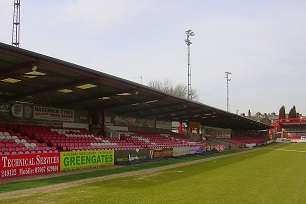The Club That Wouldn’t Die
 Very rarely does one usually have an epiphany at a urinal in a Lancastrian Portakabin. A few years back, as I watched my team slip to another defeat at Accrington Stanley’s Crown Ground (I’m still yet to see a victory there), it struck me what Accrington were achieving at that time was on the verge of miraculous.
Very rarely does one usually have an epiphany at a urinal in a Lancastrian Portakabin. A few years back, as I watched my team slip to another defeat at Accrington Stanley’s Crown Ground (I’m still yet to see a victory there), it struck me what Accrington were achieving at that time was on the verge of miraculous.
As this is written, Stanley are joint 2nd in League 2, 5 points off the top. This is achieved on the 2nd lowest budget in the league, quoted by chairman Andy Holt as being £868,000. They entertain the 2nd lowest average attendance in League 2, a smidgen over the 1,500 mark. Now, it is not comparable to the disparity in wealth of the Premier League, but when Stanley are 5 points behind Luton, who boast 7,000 more fans at each home game, it might be time to sit up and take notice of a remarkable football club.
The obvious jokes are there; a moustached striker, milk, the irritatingly annoying advert which permeates football to this day (cheers Soccer AM). An unfashionable name, in an unfashionable part of the country, with an unfashionable manager. Stanley are not a club with sex appeal.
However, as you enter their ground, the words “the club that wouldn’t die”, referencing their rebirth following the demise of the original Accrington Stanley in 1968. This serves as an introduction to the spirit that encapsulates Stanley; a perseverance, an unshakeable willingness to compete against teams with fancier stadiums, larger budgets, and bigger names.
Take a cursory glance at their squad list now; apart from maybe Billy Kee, a regular League 2 goal-plunderer, even the most ardent of lower league football fans would be hard-pressed to recognise many names. Stanley’s budget simply doesn’t allow for bigger name signings. The squad is overwhelmingly comprised of young lads who failed to make the grade at larger clubs, former non-league players, and a smattering of players from the Scottish and Irish leagues.
How have they managed it? With an ostensibly low-key squad, a low budget, and small fanbase, how are Stanley on the verge of competing in English football’s third tier for the first time? The answer isn’t simple, but a large amount can be attributed to two men; John Coleman and Andy Holt.
Fans of lower league football will be well acquainted with Coleman; a tough Scouser, he has been the boss at Stanley for 19 years, bar a 2 year spell at Rochdale, Sligo Rovers, and Southport. With a focus on work rate, organisation, and discipline, Coleman has marshalled a low-budget squad into a competitive force for many years. Supported by his trusted assistant Jimmy Bell, Coleman led Stanley back into the Football League and has kept them there, with recent years seeing them tilt at the top end of the division.
However, a portrayal of Coleman as a no-nonsense, standard lower league, aggressive manager is horrendously off the mark; a recent piece by the BBC on Billy Kee’s battle with depression and anxiety featured a section from Coleman. In this, he showed an excellent appreciation of the battles inherent in mental illness and the understanding which was crucial in helping Kee return to playing for Stanley and being their standout player this term. At a time when we learn of more and more footballers struggling with mental health, it is refreshing and uplifting to hear a manager so understanding of his star striker, and the spirit fostered in the Stanley dressing room, which Kee expresses gratitude for.
This sort of caring attitude doesn’t stop at pitch level; we see a willingness to engage in the community of the pitch.. Andy Holt, owner of Wham, a plastic houseware company, recently made headlines with his imitative to give away a Stanley home shirt to every Year 3 child in town as part of a day to commemorate the club’s rebirth. Players were on hand to dish out the shirts to the youngsters, and you get a real sense of community that seems to be slipping out of the modern game. Fans credit Holt with providing crucial stability to the club, tying players down onto longer-term contracts to reduce the mass turnover that lower league clubs contend with every summer.
Stanley may not win promotion; the race is tight and their squad thin. However, the signs point towards a memorable season that culminates in the success that Coleman, Holt, the staff, players, and fans deserve. Despite the odds having been against them since they kicked the door into the Football League down, Stanley have competed admirably with the bigger boys, ensuring to foster community values and an understanding with their players which should not go unnoticed. Amongst all the platitudes we see given to the elite of this sport, it’s time we recognise the wonders being worked at the club that wouldn’t die.
words Joe Baker, Port Vale fan and writer for D3D4 Football
Joe Baker Twitter: joebaker97


